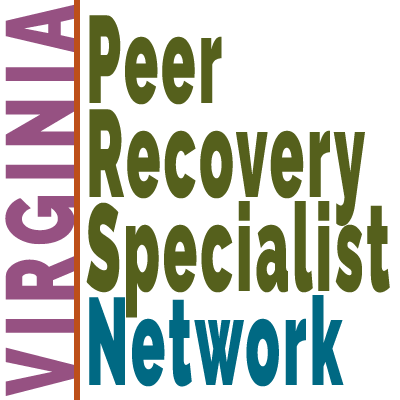IC & RC
Peer Recovery Performance Domains
Experience and Supervision Requirements for Virginia CPRS
Experience
- 500 hours of volunteer or paid experience specific to the domains. The applicant must be currently providing peer recovery support services.
- Volunteer and part-time experience is acceptable if it is provided under direct supervision. Actual time spent in a supervised substance abuse or mental health internship, or practicum may be applied toward the employment requirement.
- Supervised work experience must be in the four CPRS domains.
Supervision
- 25 hours specific to the domains.
Supervision is a formal or informal process that is administrative, evaluative, clinical, and supportive. It can be provided by more than one person, it ensures quality of care, and extends over time. Supervision includes observation, mentoring, coaching, evaluating, inspiring, and creating an atmosphere that promotes self-motivation, learning, and professional development. In all aspects of the supervision process, ethical and diversity issues must be in the forefront.
Domains for Virginia CPRS
The 2013 Peer Recovery Job Analysis identified four performance domains for the IC&RC Peer Recovery Exam:
- Advocacy
- Ethical Responsibility
- Mentoring and Education
- Recovery/Wellness Support
Domain 1: Advocacy
Associated Tasks:
- Relate to the individual as an advocate.
- Advocate within systems to promote person-centered recovery/wellness support services.
- Describe the individual’s rights and responsibilities.
- Apply the principles of individual choice and self‐determination.
- Explain importance of self-advocacy as a component of recovery/wellness.
- Recognize and use person-centered language.
- Practice effective communication skills.
- Differentiate between the types and levels of advocacy.
- Collaborate with individual to identify, link, and coordinate choices with resources.
- Advocate for multiple pathways to recovery/wellness.
- Recognize the importance of a holistic (e.g., mind, body, spirit, environment) approach to recovery/wellness.
Domain 2: Ethical Responsibility
Associated Tasks:
- Recognize risk indicators that may affect the individual’s welfare and safety.
- Respond to personal risk indicators to assure welfare and safety.
- Communicate to support network personal issues that impact ability to perform job duties.
- Report suspicions of abuse or neglect to appropriate authority.
- Evaluate the individual’s satisfaction with their progress toward recovery/wellness goals.
- Maintain documentation and collect data as required.
- Adhere to responsibilities and limits of the role.
- Apply fundamentals of cultural competency.
- Recognize and adhere to the rules of confidentiality.
- Recognize and maintain professional and personal boundaries.
- Recognize and address personal and institutional biases and behaviors.
- Maintain current, accurate knowledge of trends and issues related to wellness and recovery.
- Recognize various crisis and emergency situations.
- Use organizational/departmental chain of command to address or resolve issues.
- Practice non-judgmental behavior.
Domain 3: Mentoring and Education
Associated Tasks:
- Serve as a role model for an individual.
- Recognize the importance of self-care.
- Establish and maintain a peer relationship rather than a hierarchical relationship.
- Educate through shared experiences.
- Support the development of healthy behavior that is based on choice.
- Describe the skills needed to self-advocate.
- Assist the individual in identifying and establishing positive relationships.
- Establish a respectful, trusting relationship with the individual.
- Demonstrate consistency by supporting individuals during ordinary and extraordinary times.
- Support the development of effective communication skills.
- Support the development of conflict resolution skills.
- Support the development of problem‐solving skills.
- Apply principles of empowerment.
- Provide resource linkage to community supports and professional services.
Domain 4: Recovery/Wellness Support
Associated Tasks:
- Assist the individual with setting goals.
- Recognize that there are multiple pathways to recovery/wellness.
- Contribute to the individual’s recovery/wellness team(s).
- Assist the individual to identify and build on their strengths and resiliencies.
- Apply effective coaching techniques such as Motivational Interviewing.
- Recognize the stages of change.
- Recognize the stages of recovery/wellness.
- Recognize signs of distress.
- Develop tools for effective outreach and continued support.
- Assist the individual in identifying support systems.
- Practice a strengths‐based approach to recovery/wellness.
- Assist the individual in identifying basic needs.
- Apply basic supportive group facilitation techniques.
- Recognize and understand the impact of trauma.
